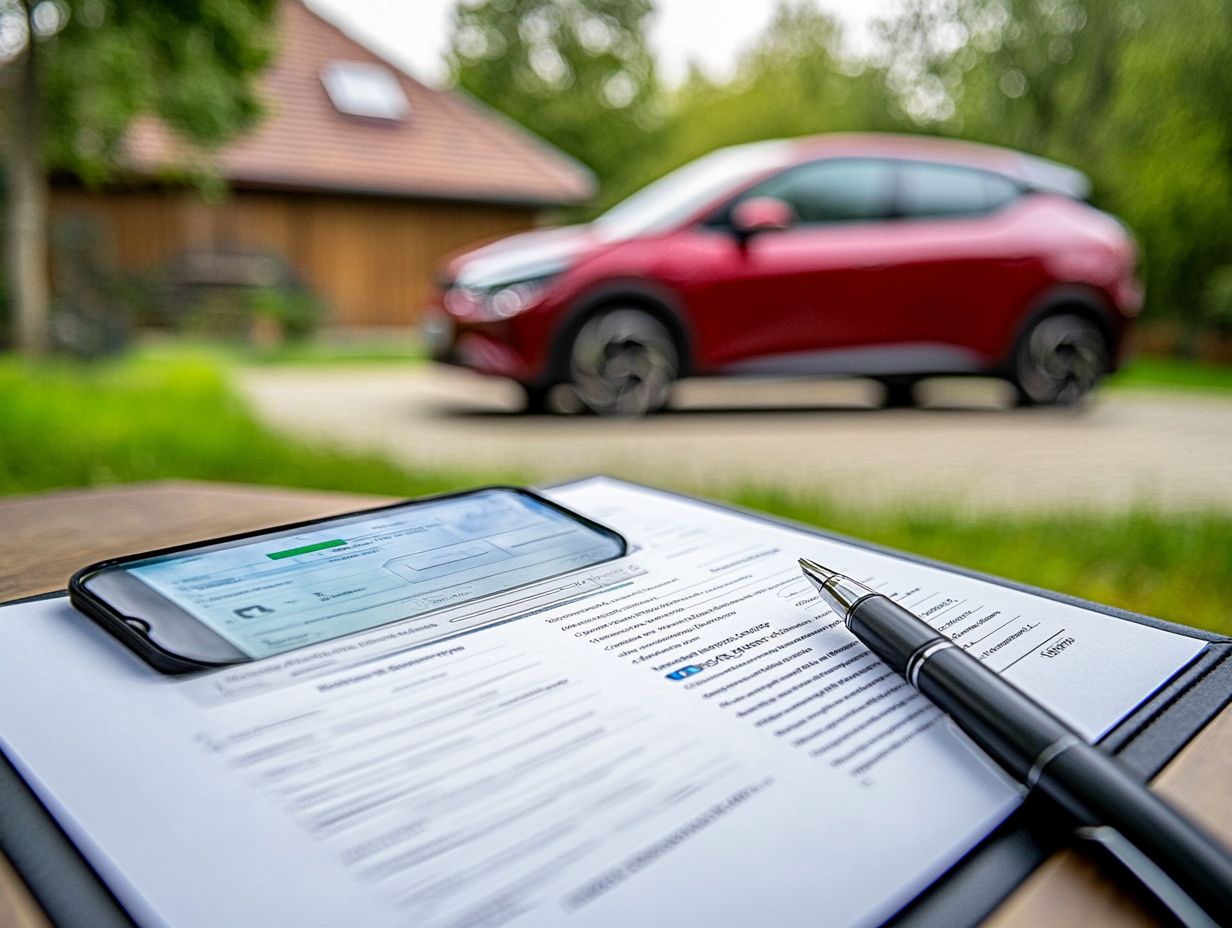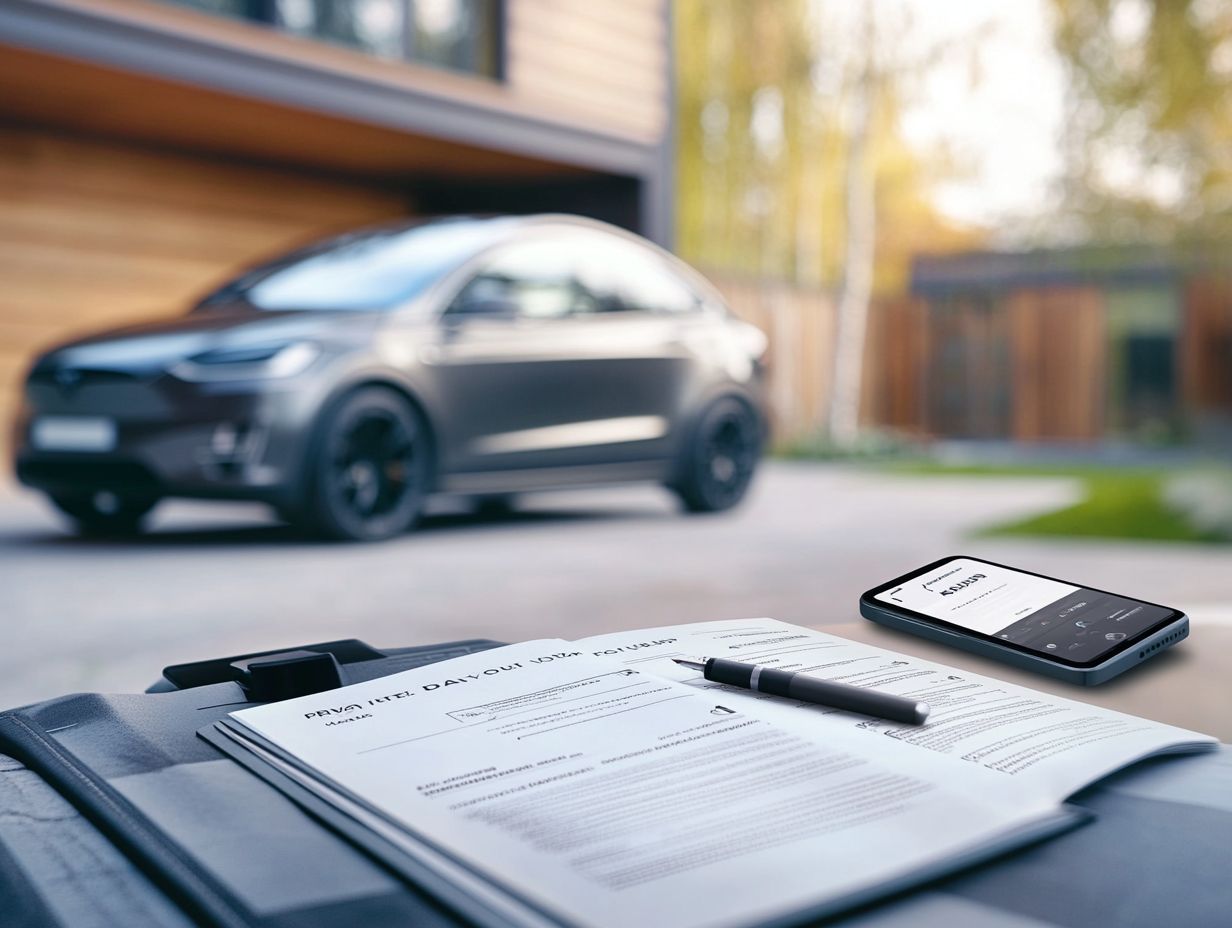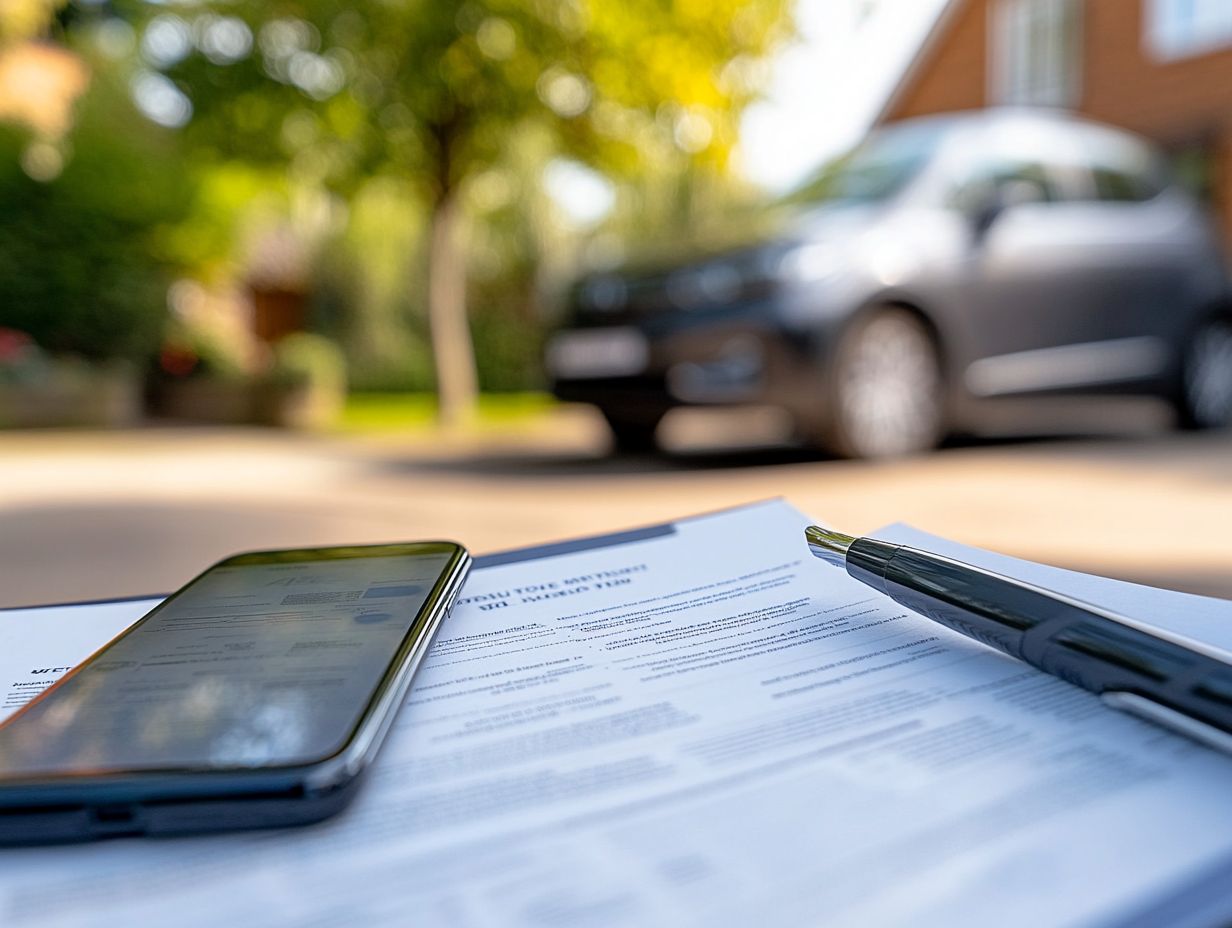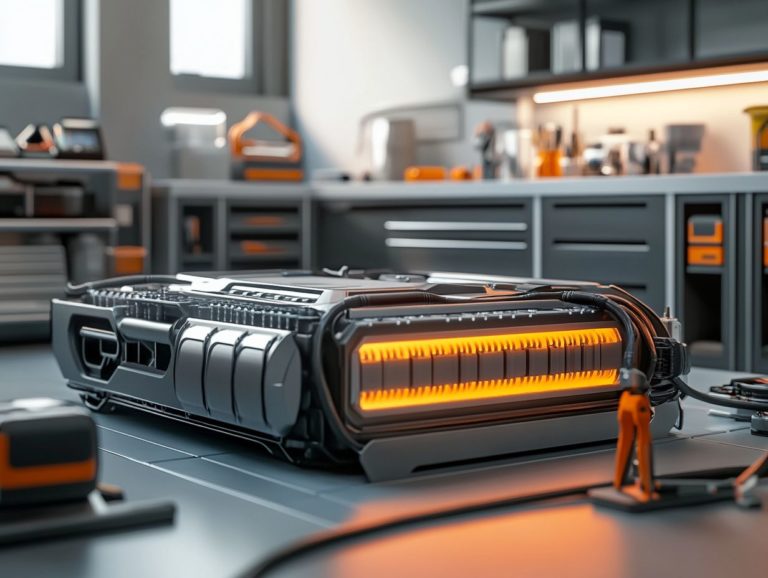understanding your ev’s warranty
Electric vehicles (EVs) are revolutionizing transportation, but navigating their warranties can seem daunting. Whether you’re a proud new EV owner or contemplating the switch, understanding what your warranty covers is essential.
This article breaks down the various types of EV warranties, including manufacturer and battery warranties, highlighting what s typically included and excluded. You ll learn the claims process, discover key factors in battery warranties, and explore your options for extending your coverage.
Prepare to empower yourself with insights that safeguard your investment!
Contents
- Key Takeaways:
- Types of EV Warranties
- What’s Covered in an EV Warranty
- How to Make a Warranty Claim
- Understanding Your EV’s Battery Warranty
- Extending Your EV Warranty
- Frequently Asked Questions
- What does an EV warranty cover?
- How long does an EV warranty last?
- What is the difference between a manufacturer’s warranty and an extended warranty?
- Are there any limitations or exclusions in an EV warranty?
- What happens if I have a problem covered by my EV’s warranty?
- Can I transfer my EV’s warranty to a new owner if I sell my vehicle?
Key Takeaways:

Understanding your EV’s warranty can save you time and money in the long run. Know the types of warranties and what they cover, especially the battery warranty. For more details, find out what you need to know about EV warranties, familiarize yourself with the steps to make a warranty claim, and explore options to extend your EV’s warranty for added peace of mind.
What is an EV Warranty?
An EV warranty is a specialized service contract for electric vehicles (EVs). It covers repairs not included under the factory warranty, providing peace of mind regarding potential costs associated with maintenance and battery replacements.
As electric vehicles gain popularity, understanding EV warranties is crucial for protecting your vehicle and ensuring reliability. Unlike traditional auto warranties, EV warranties focus on components unique to electric technology, such as the battery and electric drive system.
Different manufacturers offer varying coverage levels. For example, Tesla emphasizes battery longevity, while others may include roadside assistance. Coverage options can range from basic plans that cover essential components to comprehensive contracts that include maintenance schedules and software updates.
Investing in a well-rounded service contract is essential for safeguarding your investment and ensuring optimal performance over time.
Types of EV Warranties
You ll find a variety of EV warranties available, from manufacturer warranties to extended options, each designed to provide targeted coverage for electric vehicles.
These warranties cover standard repairs and offer additional benefits that reflect the manufacturer s reputation for reliability and quality assurance. Keep in mind, these attributes can differ significantly between manufacturers like Tesla, Ford, and Nissan.
Manufacturer Warranty
A manufacturer warranty provides coverage directly from the vehicle’s maker against defects in materials and workmanship for a specified period. This warranty is crucial for electric vehicles, as it often includes protection for the battery and electric system.
Owners of brands like Kia, Chevrolet, and Tesla can trust they re investing in the reliability and performance their vehicles promise. These warranties typically cover vital components like the electric motor and battery system, which are essential for the efficient operation of EVs.
Reliability ratings play a significant role in your decision-making process as a buyer. Weighing warranty offerings against these ratings can help you secure peace of mind. A brand that provides extensive coverage alongside high reliability could encourage a confident purchase.
Don’t miss out on understanding your warranty! Evaluate your EV warranty options or consult with your dealer for more information.
Battery Warranty
The battery warranty is a key part of any electric vehicle warranty. It specifically covers the performance and replacement needs of your battery.
Given the high costs of EV batteries, manufacturers like Tesla and Chevrolet offer extended battery coverage.
If your battery fails or doesn t perform well, your warranty can help reduce financial stress. This coverage brings peace of mind and enhances your overall ownership experience.
Warranties typically cover issues like capacity loss and performance decline. Coverage lengths vary; some provide protection for up to eight years or 100,000 miles.
Knowing these differences is vital. A good warranty can greatly affect your total cost of ownership and give you essential peace of mind about your investment.
What’s Covered in an EV Warranty

Understanding what s included in an EV warranty is crucial for electric vehicle owners. These warranties can differ significantly in the services and repairs they cover.
Common coverage includes repairs related to the electrical system and battery replacements. You can expect services designed to enhance your peace of mind regarding maintenance.
This coverage safeguards owners of vehicles like Tesla, Kia, and Chevrolet against unexpected repair costs that can catch you off guard.
Common Inclusions
Commonly included in EV warranties are various repairs and maintenance services. These typically cover repairs to the vehicle’s electrical system, battery replacements, powertrain warranty coverage, and roadside assistance.
This allows owners of models like Tesla, Kia, and Chevrolet to enjoy their electric vehicles without worry.
Knowing these services can save you money and stress, as they can significantly lower your long-term ownership expenses. Comprehensive diagnostics can catch potential issues before they become costly, helping you avoid major repair bills.
Battery replacement coverage is essential since batteries are among the most substantial investments you’ll make with an electric vehicle. Regular maintenance services, like software updates and inspections, ensure optimal performance and longevity.
By grasping the nuances of warranty coverage, you can make informed decisions that maximize your investment. This ultimately leads to a seamless and enjoyable driving experience.
Exclusions to Watch Out For
While EV warranties offer valuable coverage, it s crucial to be aware of common exclusions that could limit your warranty’s benefits.
Many warranties exclude coverage for wear-and-tear items, modifications, and damages from improper maintenance. This can significantly affect your financial liability if repairs are needed for electric vehicles like Tesla or Chevrolet.
Many warranty plans do not cover specific components such as the battery management system or charging equipment. These components are essential for the proper functioning of electric vehicles.
Issues arising from accidents or natural disasters often fall outside the warranty s scope. Given these potential gaps, carefully examine your warranty documentation.
Seek clarification on any ambiguous terms to ensure you fully understand your protection and avoid unforeseen costs when filing claims.
How to Make a Warranty Claim
Submitting a warranty claim for your EV can be a seamless experience when you understand the steps involved and have a clear grasp of your warranty coverage.
Report any issues to your dealership or service provider promptly. Make sure you have all the necessary documentation on hand such as proof of purchase and service records.
This preparation will facilitate repairs and help ensure your service contract is upheld.
Steps to Follow
To navigate your EV’s warranty claim successfully, follow these steps:
- Gather necessary documents.
- Contact your service provider.
- Clearly explain the issues with your vehicle.
Being proactive and organized helps manage the claims process and reduces potential repair delays.
Start by compiling relevant documents, like the original warranty paperwork and service history. These documents prove your eligibility.
Next, keep open communication with your service provider. A polite yet assertive approach fosters a good dialogue.
When explaining vehicle issues, provide detailed descriptions of symptoms. Photos can greatly support your claim.
Maintain meticulous records of all interactions, including dates and representative names. This information is invaluable if further discussions arise.
Following these practices streamlines the process and boosts your chances of a favorable outcome.
Understanding Your EV’s Battery Warranty

Knowing the details of your EV’s battery warranty is vital for enjoying electric vehicle ownership.
Manufacturers offer different coverage options and terms for battery replacements. Familiarize yourself with the specifics.
Review the warranty details, including duration, mileage limits, and conditions needed to claim coverage for battery-related issues.
This knowledge enhances your overall EV experience.
Key Factors to Consider
When evaluating your EV’s battery warranty, consider factors like duration, mileage limits, and specific coverage from manufacturers like Tesla, Chevrolet, and Kia. Understanding these aspects helps you make informed maintenance decisions and protects you from costly repairs.
Maintenance practices significantly impact battery performance. Regular charging habits, extreme temperature exposure, and fast charging frequency all affect your battery’s longevity.
These aspects may lead to performance issues and potential warranty claims. Understanding how manufacturers manage these variables offers valuable insights.
Grasping these nuances helps you navigate your options effectively and maximize your warranty benefits.
Extending Your EV Warranty
Extending your EV warranty enhances peace of mind by providing protection against unexpected repair costs. Enjoy driving your electric vehicle without worrying about potential expenses exceeding standard coverage.
Extended warranties are available for various electric vehicle models, including those from Tesla, Kia, and Chevrolet. These warranties offer coverage options tailored to your needs.
Options and Benefits
When considering an extended warranty for your EV, various options and benefits can enhance your ownership experience.
Think about additional roadside assistance, rental car coverage, and broader repair options. These features provide you with full protection, reducing the financial risks tied to repairs while ensuring you enjoy a higher level of service throughout the warranty period.
Opting for a warranty that covers specialized EV components can significantly ease the financial burden of potential repairs, especially for unique electric drivetrains and batteries that store a lot of energy.
Many providers offer flexible terms, allowing you to choose plans that fit your driving habits and how you use your vehicle. Want peace of mind? A solid warranty is your answer!
You can also choose a warranty with zero deductibles, reducing unexpected expenses and making this investment more appealing if you want to keep your vehicle reliable without stretching your budget.
Frequently Asked Questions
What does an EV warranty cover?

An EV warranty typically covers major components such as the battery, motor, and the system that powers your vehicle. It may also cover defects in workmanship and materials.
How long does an EV warranty last?
The length of an EV warranty can vary, but most manufacturers offer a warranty of 8-10 years for the battery and 3-5 years for the rest of the vehicle.
What is the difference between a manufacturer’s warranty and an extended warranty?
A manufacturer’s warranty is provided by the company that made the vehicle and is included in the purchase price. An extended warranty is additional coverage that can be purchased for an extra cost and extends the length of the warranty.
Are there any limitations or exclusions in an EV warranty?
Yes, EV warranties may have limitations or exclusions for certain components or situations, such as damage caused by accidents or improper use. It is important to carefully read and understand the terms and conditions of your EV’s warranty.
What happens if I have a problem covered by my EV’s warranty?
If you have a problem covered by your EV’s warranty, you should contact the manufacturer or a certified dealership to have the issue resolved. They will typically cover the cost of repairs or replacements for covered components.
Can I transfer my EV’s warranty to a new owner if I sell my vehicle?
This will depend on the specific warranty and manufacturer. Some EV warranties may be transferable to a new owner, while others may only apply to the original purchaser. It is best to check with the manufacturer for their policies on transferring warranties.
Don’t leave your investment unprotected! Explore warranty options today!





